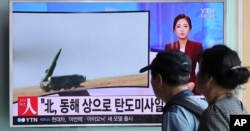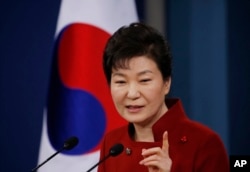Following North Korea’s failed missile test over the weekend, South Korea has ruled out seeking compromise with the Kim Jong Un government.
And a potential candidate for U.S. secretary of defense if Hillary Clinton wins the presidential election said negotiations with Pyongyang at this time would be a “waste of time.”
These hard-line positions seem to negate arguments by some that the current sanctions are not working and that Washington and its allies must offer Pyongyang incentives to bring a peaceful end to the increasingly tense situation on the Korean Peninsula.
Failed test
The U.S. military reported Saturday that North Korea tried to launch an intermediate-range ballistic missile. South Korea reported the missile exploded seconds after it was launched.
Analysts speculate a new rocket engine or type of fuel was being tested and could have caused the explosion.
The North Korean missile was presumed to be a Musadan rocket that has the range to reach the U.S. military installation in Guam.
It was launched from the city of Kusong, near the Chinese border, which is a different site than had been used in past missile tests.
"There is a high possibility that North Korea chose a third place other than previous missile launch sites because it needed to show that it can strike its target at anytime and anywhere it wants, even if (its enemy) deploys THAAD and utilize fighter bombers and carriers," said Chung Sung-yoon, a researcher at the Korea Institute for National Unification.
North Korea has test fired at least 21 ballistic missiles and conducted two nuclear tests so far this year.
Saturday’s launch was North Korea’s seventh test of a Musadan intermediate-range missile. The first test on April 15 was fired from the east coast city of Wonsan.
The only successful launch, which occurred on June 22, reached an altitude of 1,000 km before falling into the sea near Japan.
President Park
South Korean President Park Geun-hye on Sunday denounced the Kim Jong Un government for pursuing nuclear weapons in defiance of international sanctions while neglecting the needs of the North Korean people.
"Although its people are suffering from a flood and economic trouble, North Korea is threatening the peace and future of Koreans by concentrating on nuclear weapons and missiles," said Park while speaking to North Korean defectors in a video message at a sporting event.
Severe flooding in North Korea this summer has left nearly 600,000 people in need of urgent assistance.
The South Korean president said her government “will not surrender to or compromise with them” and would work with the international community to increase the pressure on the Kim government to give up its nuclear arsenal in return for assistance, normalized relations and security guarantees.
Following North Korea’s fifth nuclear test in September, the U.N. Security Council agreed to consider imposing further economic sanctions on Pyongyang.
Clinton hard line
Michele Flournoy, who some media outlets have reported as being considered for U.S. defense secretary in Hillary Clinton’s administration if she wins the November presidential election, has also taken a hard line against North Korea.
Flournoy is co-founder of the national security and defense policy think tank in Washington: the Center for a New American Security (CNAS). She was also an undersecretary of defense during President Barack Obama’s first term.
In a recent interview with the South Korean Yonhap News Agency, she said, without a commitment from North Korea to work toward denuclearization, negotiations would be "a waste of time."
A group of former U.S. officials and regional analysts recently recommended that Washington offer Pyongyang incentives like immediate food aid and a possible reduction in U.S.-South Korea joint military exercises in return for a moratorium on nuclear and missile tests.
Their recommendations are conditioned on North Korea demonstrating a commitment to address the denuclearization issue, and offer the possibility of further concessions in the future, including a formal peace treaty and the normalization of relations, if real progress is achieved.
Flournoy, however, emphasized during her interview support for increased military deterrence like the deployment of the U.S. THAAD anti-missile shield in South Korea, and said that “the focus of our policy should be to try to put through sanctions and other pressure, get the leadership to come back to the negotiating table and make good on their earlier promises of denuclearization."
Her views could indicate that under Clinton the U.S. would continue to support strong sanctions and deterrence against North Korea and maintain a close American military alliance with South Korea.
In contrast, the Republican candidate for president, Donald Trump, has said he may radically change Washington’s security relationship with Seoul and Tokyo by pulling out the more than 75,000 U.S. troops in the region unless those nations agree to pay more for the U.S. military bases in their countries, and instead permit allies to develop their own nuclear deterrence.
Youmi Kim and Han Sang-mi in Seoul contributed to this report.







